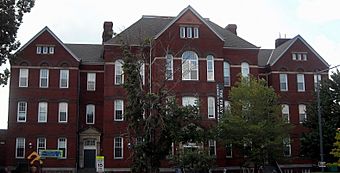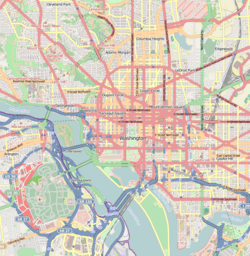M Street High School facts for kids
Quick facts for kids |
|
|
M Street High School
|
|
 |
|
| Location | 128 M St., NW Washington, D.C. |
|---|---|
| Built | 1891 |
| Architect | Thomas Entwistle |
| Architectural style | Romanesque Revival |
| NRHP reference No. | 86002924 |
| Added to NRHP | October 23, 1986 |
The M Street High School, also known as Perry School, is a historic building in Washington, D.C.. It used to be a school, but now it's a community center. This building is very important because it was one of the first high schools for African Americans in the United States.
It has been recognized as a historic site in Washington, D.C., since 1978. In 1986, it was added to the National Register of Historic Places. This means it's a special place worth protecting. Thanks to people in the community who wanted to save it, the building was not torn down.
Contents
History of M Street High School
Early Years and Building Construction
The school first opened in 1870. It was called the Preparatory High School for Negro Youth or Washington High School. For many years, the school moved around to different temporary places.
In 1890, the U.S. government gave money to build a permanent school. Thomas Entwistle designed the building on M Street. It was built between 1890 and 1891.
A Pioneer School for African Americans
M Street High School was one of the very first high schools for African Americans in the country. It played a big part in the history of education in Washington, D.C. At that time, African Americans had to fight hard to get good schools.
The city had a "dual school system," which meant separate schools for white and Black students. This often led to Black schools having worse buildings and fewer resources. However, M Street High School was special. It offered a very strong learning program.
Many amazing teachers worked there. This was partly because there were not many other professional jobs for African Americans back then. Famous principals included Francis L. Cardozo, Sr., Robert H. Terrell, and Anna J. Cooper.
Even Carter G. Woodson, a famous historian, taught subjects like French and history there. Christian Abraham Fleetwood, who received the Medal of Honor, also taught at the school.
The school helped many students go to college. Graduates went to top universities like Harvard and Yale. Many became important educators and public figures.
Changes Over the Years
In 1916, the high school moved to a new building. It was renamed Dunbar High School after the poet Paul Laurence Dunbar.
The M Street building then became a junior high school in 1919. It was later called Shaw Junior High School. In 1928, Shaw Junior High moved to a different location.
From 1929 to 1932, the M Street building was used by students from Cardozo High School. After that, it became M Street Junior High School again, and later Terrell Junior High School.
In 1952, the school was renamed Leon L. Perry Middle School. This honored a principal and school board member named Leon L. Perry. In 1954, schools in D.C. began to allow students of all races to attend together. Soon after, the Perry School building closed as a school.
Saving a Historic Building
Even after closing as a school, the building continued to be used. In the 1960s, it helped people in need as a homeless shelter.
In 1978, there were plans to tear down the building. But people fought to save it. They wanted it to be recognized as a historic landmark. Because of their efforts, the school board decided to protect the building instead of demolishing it.
In the 1980s, the city thought about selling the building to developers. But the local community wanted to keep it for public use. In 1986, it was officially listed on the National Register of Historic Places. In 1989, the D.C. school board agreed to use the empty Perry School building as a community service center.
Since 1998, the building has been home to the Perry School Community Services, Inc. This is a non-profit group that offers health and community services to local residents.
Notable Students of M Street High School
Many talented people attended M Street High School. Here are a few:
- Julia Evangeline Brooks (1882–1948) – An educator and a founder of the Alpha Kappa Alpha sorority.
- Nannie Helen Burroughs (1879–1961) – A well-known educator and founder of a school.
- Sadie Tanner Mossell Alexander (1898–1989) – The first African-American woman to earn a PhD in Economics. She was also the first Black woman admitted to the Pennsylvania Bar.
- Mary P. Burrill (1881–1946) – A playwright and educator.
- Ford Dabney (1883–1958) – A ragtime pianist, composer, and jazz band leader.
- Benjamin O. Davis, Sr. (1877–1970) – The first African-American general officer in the U.S. Army.
- Eva Beatrice Dykes (1893–1986) – An educator and the first African-American woman to earn a doctorate degree.
- Charles Hamilton Houston (1895–1950) – A very important Civil Rights Attorney.
- Jean Toomer (1894–1967) – An African American poet and novelist linked to the Harlem Renaissance.
- Robert C. Weaver (1907–1997) – The first African American to serve as a Cabinet Secretary in the U.S. government.
Notable Faculty of M Street High School
The school also had many outstanding teachers:
- G. David Houston (1880–1940) – Later became an English Professor at Howard University.
- Anna Julia Cooper (1858–1964) – An author known for her writings on Black women’s political ideas.
 | Delilah Pierce |
 | Gordon Parks |
 | Augusta Savage |
 | Charles Ethan Porter |


